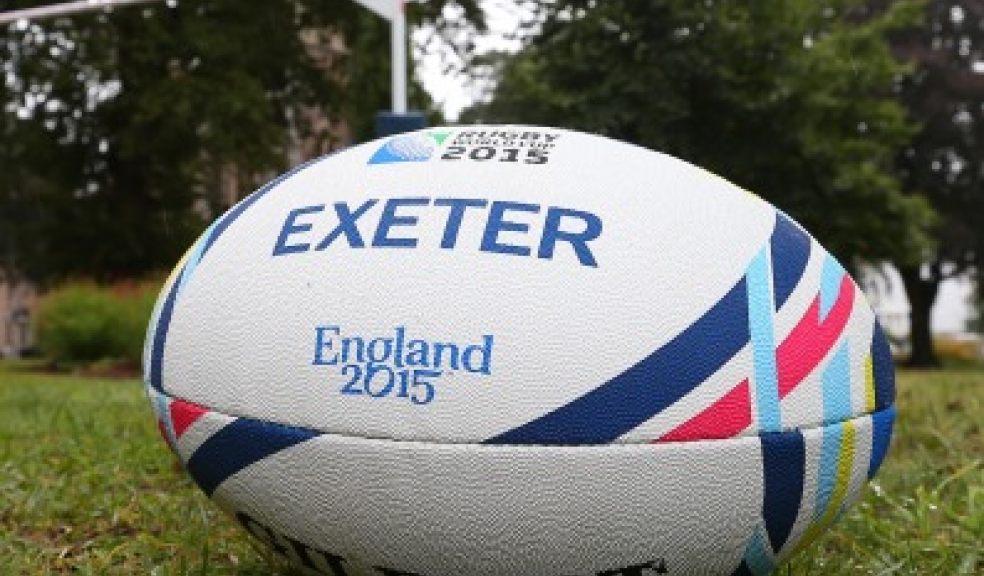
RWC2015 set to generate £39m for Exeter
A new report says that the Rugby World Cup 2015 will generate £39 million of economic activity for Exeter.
The report, from England Rugby 2015, says that the Tournament is set to deliver nearly £1 billion into the UK economy.
Reacting to the report, Cllr Rosie Denham, Exeter City Council's Lead Councillor for Economy and Culture, said: "The latest figures for Exeter are very encouraging. In ten months time the eyes of the world will be on Exeter and we are very optimistic that the Rugby World Cup will bring thousands of extra people into the city from home and abroad.
"Exeter is a fantastic city that has much to offer and this combined with the games at Sandy Park and a real match atmosphere in our Fanzone in the city centre is going to provide a real boost for Exeter's economy."
The report says that:
- Tournament predicted to generate up to £2.2 billion of output into economy
- Expected to add up to £982 million of value to national GDP
- More international visitors expected than any other Rugby World Cup
- £85 million invested in infrastructure
- 41,000 jobs to be supported around the country
- Economic benefit to be shared around 11 Host Cities
An economic impact study has revealed that Rugby World Cup 2015 in England is set to deliver nearly £1 billion of additive value into the UK economy.
The study, which was undertaken by EY on behalf of the Organising Committee for Rugby World Cup 2015, England Rugby 2015, looked at the different ways in which a Rugby World Cup can benefit the Host Nation. It estimates that the Tournament will generate a total output of around £2.2 billion, which is in line with a previous economic study undertaken by Deloitte in 2008. The EY report predicts that this will translate into a contribution of £982 million to national GDP.
A full copy of the report can be seen here.
The report states that Rugby World Cup 2015 is expected to attract more international visitors than any previous Rugby World Cup, with an estimate of up to 466,000 visits. Through spend on items including travel and accommodation, visitors are expected to contribute up to £869 million in direct expenditure.
In 2011, 133,000 visitors stayed an average of 23 nights during the 44-day event with an overall economic impact of $NZD 1.73 billion.
Chief Executive of England Rugby 2015, Debbie Jevans, said: “Rugby World Cup 2015 is set to create a wide range of economic opportunities across many different sectors. Whether through investment in infrastructure, supporting jobs or generating revenue in Fanzones, the economic benefits will be shared around our eleven Host Cities and beyond. With Rugby World Cup 2015 expected to attract more visitors than any previous Rugby World Cup, the Tournament is on track to deliver a strong economic legacy.”
With many of the match venues and Team Bases improving their facilities ahead of the Tournament and Host Cities committing to improving transport links, the report estimates that £85 million has been invested in infrastructure. This includes the £76 million redevelopment of Twickenham Stadium by the Rugby Football Union. These infrastructure investments are expected to continue to deliver benefits to the local communities long after the Tournament has finished.
The author of the report, Peter Arnold, a Director from EY, added: “Our forecasts are based on a whole range of direct, indirect and induced benefits of Rugby World Cup 2015, from the investment that will be made in infrastructure to the ticket and tax revenues that will be generated. The Tournament creates economic activity and employment throughout the supply chain, which has the potential to bolster the growth of the Host Cities as well as the UK overall.”
The hosting of the Tournament will help support a wide range of job opportunities across different sectors for a variety of different demographics of the population. The report estimates that up to 41,000 jobs will be supported across the country. This includes 16,000 employees directly linked to the Tournament and 12,000 along the supply chain.
With the Tournament being hosted across 13 venues in 11 cities, the economic benefits will be shared around the country. The report estimates figures for each of the Host Cities and looks at Exeter and Newcastle as case studies. It is estimated that in Exeter the Tournament will generate economic output of £39 million and, of this, £17 million will be added to the local economy. For Newcastle, the Tournament is estimated to generate economic output of £93 million and of this, £43 million will be added to the local economy.
Rugby World Cup Limited Chairman Bernard Lapasset said: “Rugby World Cup is one of the world’s biggest and most popular global sporting events that attracts sports and major event fans from around the world for a six-week celebration of Rugby and the Host Nation.
“The findings of the EY report outline the enormous economic, sporting and social benefits of Rugby World Cup, reaffirming its low-risk, high-return attractiveness to future host unions and governments and just why the tournament increasingly is great for Rugby and great for the Host Nation.
“We are looking forward to a very special and record-breaking England 2015 Tournament on and off the field that will provide a strong profile and financial platform to reach out, attract and inspire new players and fans around the world.”
Minister for Sport, Helen Grant, said: “Rugby World Cup 2015 will be a fantastic opportunity to showcase the very best of what this country has to offer to an international audience. Hosting the Tournament next year will further cement the UK’s reputation in hosting major sporting events, create additional jobs and I’m extremely encouraged by the £1billion contribution the competition will make to the economy.”













